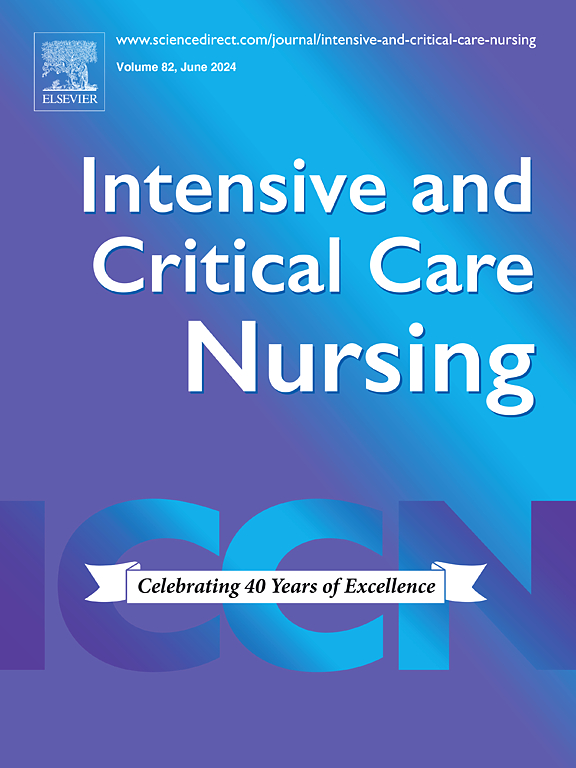Revolutionizing recovery: The impact of designed digital care therapy on preventing Post-Intensive care syndrome
IF 4.7
2区 医学
Q1 NURSING
引用次数: 0
Abstract
Objectives
This study aims to evaluate the effect of implementing a designed digital care therapy (DCT) program on preventing post intensive care syndrome (PICS) among critically ill patients.
Methods
A quasi-experimental study was conducted on 120 patients in two ICUs at a tertiary hospital. Patients were randomly assigned to an intervention group (n = 60) that received DCT, including interactive games on mobiles and tablets, and a control group (n = 60) that received routine ICU care. Data were collected on physical complications, cognitive disabilities, psychological outcomes, and secondary outcomes related to PICS using validated assessment tools at baseline, during intervention, and at end of DCT program.
Results
DCT group showed a significant reduction in psychological complications (p < 0.01), with reduced anxiety (2.733 ± 3.885), depression (5.966 ± 1.519), and delirium episodes (5 %) compared to control group (10.00 ± 3.434, 6.900 ± 0.959, & 25 %, respectively). Physical outcomes improved significantly (p < 0.01) in DCT group, with higher mean muscle strength (4.83 ± 0.874) compared to control group (3.20 ± 0.996). DCT group also had elevated cognitive functioning scores (94.466 ± 7.695), highlighting its effectiveness.
Conclusions
In this study, implementing a structured DCT program for critically ill patients was associated with reductions in physical, cognitive, and psychological impairments related to PICS. These findings suggest that DCT may enhance recovery outcomes and contribute positively to the quality of ICU care.
Implications for Clinical Practice
DCT has the potential to enhance recovery in ICU patients by addressing symptoms associated with PICS. Its integration into critical care practices could offer an innovative and accessible approach to rehabilitation, promoting improved physical, psychological, and cognitive outcomes. However, further research is warranted to validate these findings across diverse populations and to establish standardized protocols for its implementation.
革命性的恢复:设计的数字护理治疗对预防重症监护后综合症的影响
目的探讨设计的数字化护理治疗(DCT)方案在重症监护后综合征(PICS)预防中的效果。方法对某三级医院2个icu的120例患者进行准实验研究。患者随机分为干预组(n = 60)和对照组(n = 60),干预组接受DCT,包括手机和平板电脑上的互动游戏,对照组接受常规ICU护理。在基线、干预期间和DCT项目结束时,使用经过验证的评估工具收集与PICS相关的身体并发症、认知障碍、心理结局和次要结局的数据。结果dct组患者心理并发症明显减少(p < 0.01),焦虑(2.733±3.885)、抑郁(5.966±1.519)、谵妄发作(5%)较对照组(10.00±3.434,6.900±0.959,25%)明显减少(p < 0.01)。DCT组患者体能指标显著改善(p < 0.01),平均肌力(4.83±0.874)高于对照组(3.20±0.996)。DCT组认知功能评分(94.466±7.695)明显提高,显示了DCT组的有效性。结论:在本研究中,对危重患者实施结构化的DCT计划与减少与PICS相关的身体、认知和心理障碍有关。这些发现表明,DCT可以提高康复结果,并对ICU护理质量做出积极贡献。对临床实践的启示ct有可能通过解决与PICS相关的症状来增强ICU患者的康复。将其整合到重症监护实践中,可以提供一种创新的、可获得的康复方法,促进身体、心理和认知结果的改善。然而,有必要进一步研究以在不同人群中验证这些发现,并建立标准化的实施方案。
本文章由计算机程序翻译,如有差异,请以英文原文为准。
求助全文
约1分钟内获得全文
求助全文
来源期刊

Intensive and Critical Care Nursing
NURSING-
CiteScore
6.30
自引率
15.10%
发文量
144
审稿时长
57 days
期刊介绍:
The aims of Intensive and Critical Care Nursing are to promote excellence of care of critically ill patients by specialist nurses and their professional colleagues; to provide an international and interdisciplinary forum for the publication, dissemination and exchange of research findings, experience and ideas; to develop and enhance the knowledge, skills, attitudes and creative thinking essential to good critical care nursing practice. The journal publishes reviews, updates and feature articles in addition to original papers and significant preliminary communications. Articles may deal with any part of practice including relevant clinical, research, educational, psychological and technological aspects.
 求助内容:
求助内容: 应助结果提醒方式:
应助结果提醒方式:


